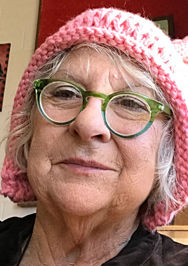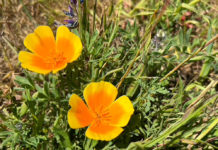Editor’s note: This column is from our sister news site, the Cloverdale Reveille. As the country surpasses 500,000 COVID-related deaths, we thought Pamela’s column might hit home to readers outside of Cloverdale.
From Aug. 15, 1996 to Aug. 15, 2004 I pastored the only church in a tiny Kansas farm community. It was the longest time since our 1981 wedding that we lived away from Cloverdale. Although we missed our Sonoma County home, we loved the time we spent in Kansas. The people were gracious, kind and generous. Our home was the lovely brick parsonage that sat on a double lot several blocks from the church.
But as our last year in Kansas passed, we began to realize that my husband’s mother, three times widowed, in her 70s and alone, was unable to care for a 106-acre mountain ranch on Pine Mountain. She needed us and so we returned home. My father-in-law had bought the place in October 1945 from his war-time earnings. In 1985 Murph hit his head on a beam while he and my husband worked on a new barn. He died two weeks later from the resulting brain aneurysm.
As for my parents, they were both in their late eighties. My mother was alone but not a widow. My father had lived in a nursing home for some years since his Parkinson’s disease had ended his ability to care for himself. The facility sat atop the cliff on the coast just outside Bandon, Oregon. I was glad his window looked out over the ocean. As a career Navy man, I hoped the sight of the Pacific would ease his anger at losing his independence and the loneliness that he would never have admitted.
Two months after we got resettled at the ranch, a phone call from my older sister summoned us to Eugene, Oregon. My mother had suffered a heart attack and she opted for surgery. We drove straight through and arrived just minutes after she had been ushered into the operating room. When the surgeon came out a short time later, we knew it wasn’t good news. He told us she had lapsed into a coma when they tried to administer anesthesia.
She surprised everyone by regaining consciousness. During that day she asked the same question over and over: “When’s the anniversary?” That night she relapsed into a coma.
She and my father’s 62nd wedding anniversary was Oct. 20, in four days. We took turns being with her. My husband and I took the night shift though I couldn’t stay away during the day. My younger sister lived just a few miles from Eugene, so we used her house as our base.
Although my mother was unresponsive, I told my sisters that hearing was the last sense to fail. We talked to her and told stories from our years of growing up, the same thing we did whenever we visited.
The days passed and I could see the fatigue on Jane and Mary’s faces. I said, “Hang in there. She’s waiting for the anniversary.” They looked at me like I was crazy. But in my eight years in Kansas I had done 58 funerals and sat by many a bedside. Thursday came, Oct. 20. A few minutes before noon, my mother took two soft breaths and was gone.
The reason I’m telling this story is I wanted to say that while it was hard to lose her, those four days were good ones, time to share what our life had been with her, time to show her we loved her, time to say goodbye. These are some of the things that the pandemic has stolen from people. Those who loved the 500,000 people who have died had no chance to brush their mother’s hair or kiss their dad’s stubbly cheek, hold their husband’s hand or whisper goodbye to their son or daughter. My hope is that as time passes, we can help each other heal from the deep wounds that have been inflicted on so many.









